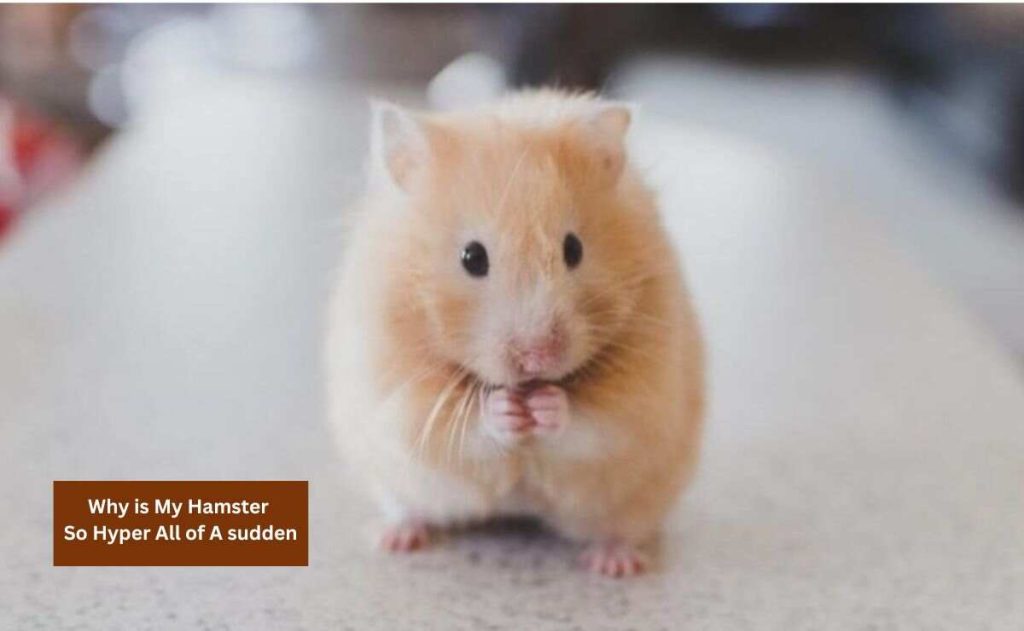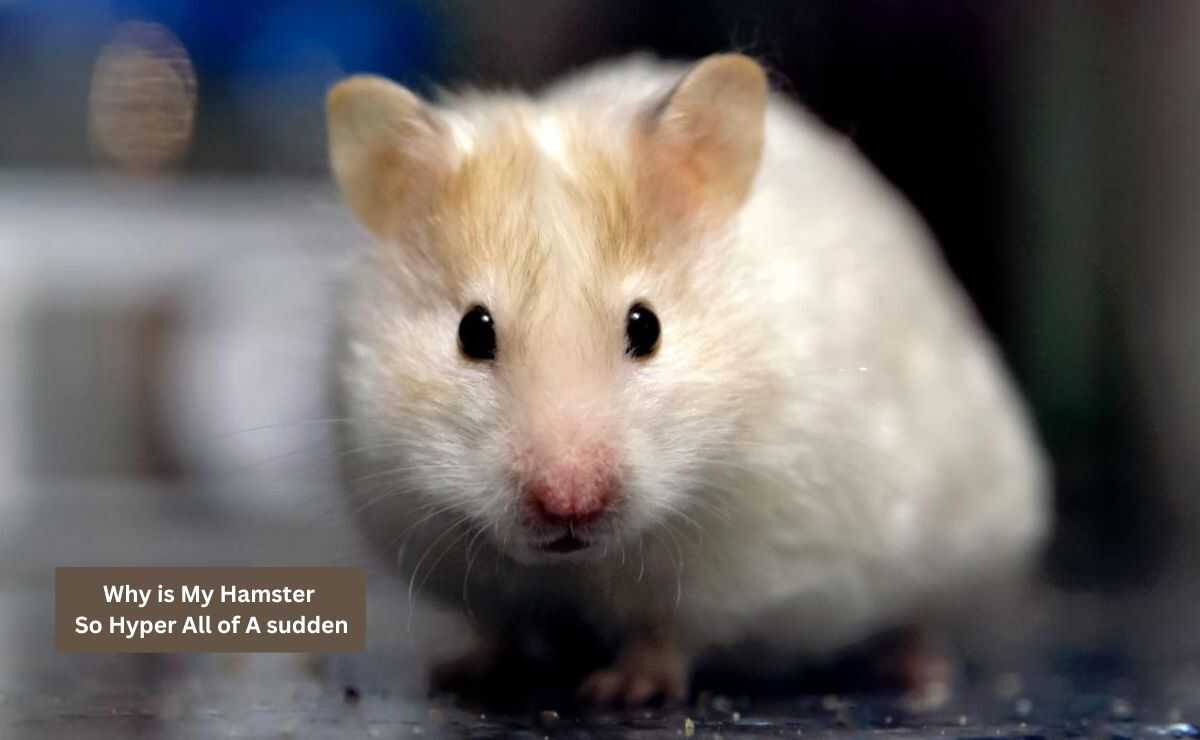Hamsters are small yet quite energetic creatures. Still, it’s a common ask of many pet owners why is my hamster so hyper all of a sudden?
Since each animal is unique, there are various reasons for getting hyper all of a sudden. However, most of the time, excitement, stress, and anxiety can be the reasons for this behavior. On the contrary, it could be nothing, just your younger energetic hamster enjoying playing. You can’t even think a hamster can run on the wheel for hours at a stretch.
Why Is My Hamster So Hyper All Of Sudden?

Hamsters can be hyperactive yet there are a multitude of factors behind their high energy levels. So here are some key reasons:
1. Stress
Hamsters have sensitive natures, and can easily be rattled by stress and fear. It significantly affects their behavior. If they are upset, you find your hamster darting and scuttling around the cage. They desperately try to escape the discomfort.
Some reasons can increase stress levels of hamsters:
- Hamsters need proper sleep. If your hamster isn’t getting enough rest, it can lead to restlessness and hyperactivity.
- The presence of another animal, even through the cage bars, can be a cause of great distress for your hamster. Hamsters are solitary creatures by nature and they feel threatened seeing a potential intruder.
- Introducing your hamster to a new environment can be overwhelming for them. It takes time for them to adapt, and during this period, they get hyper to show their discomfort.
- Even subtle changes in their cage setup, like rearranging toys or adding new accessories, can unsettle your hamster.
- Hamsters have sensitive ears, and loud noises can easily startle them.
- Overcrowding in the cage can lead to territorial disputes and stress. Most hamster species are territorial by nature and start fighting when forced to share space.
2. Boredom
Hamsters easily get bored if they don’t get mental stimulation. So they entertain themselves by increasing their activity. Hamsters need physical and mental stimulation, otherwise, they get restless.
To prevent boredom, instead of loading up your hamster’s cage with all their toys at once, consider a weekly toy rotation. This keeps their environment fresh and exciting. Interacting with your hamster on a daily basis is crucial. Let them out of their cage and provide a larger, secure space where they can stretch their legs. This will be a new experience for them.
3. Estrus
If your hamster is female, they feel hyperactive during their estrus cycle. According to research, female hamsters have heightened activity levels during their pro-estrus and estrus days. The estrus cycle is a natural biological process, and during specific phases, female hamsters become more active. These periods are when they are receptive to mating.
Your hyperactive female hamster might be on the lookout for a potential mate during her heightened hormonal state. This quest can lead to increased running and exploration as she seeks out a partner.
4. Excitement and Happiness
Hamsters get hyper when simply they are excited and happy. They are naturally active animals and have a penchant for play and exploration, so it’s not unusual for them to play around with spirited activities.
Hamsters often become hyper when they are thrilled or experiencing extreme joy. Hamsters, in general, have an abundance of energy and a propensity for movement. When they’re awake, expect them to be on the move – it’s simply their natural behavior. Interestingly, trying to calm down a hyper hamster might backfire, they become more hyper.
5. Starvation
Hamsters tend to be hyper when they feel short-term starvation. It’s like a natural response to the anticipation of a meal.
In the wild, hamsters forage for their food. When they feel hungry, they get into action and search for their food. However, in a cage, a hungry hamster can’t roam to find food. So it resorts to running around the cage or spinning on its wheel.
If your hamster appears hyperactive only before feeding, you need to reschedule their feeding time. Adjusting the timing of meals could help manage their hyperactivity.
Is It Normal for a Hamster To Be So Hyper?
Hamsters come in different personalities. Some breeds tend to be more naturally active and energetic, while others have a more laid-back disposition. So, a certain degree of hyperactivity can be quite normal, depending on the hamster’s breed and individual personality. Some hamsters are born with a naturally hyper personality.
If your hamster is young, their hyperactivity might be due to their age. Young hamsters are still learning to use their muscles and may engage in behaviors like running in circles, jumping around, and chasing imaginary prey. This is part of their development.
While hamsters are typically active, sudden and excessive hyperactivity might be an indication that something is amiss. Stress, fear, illness, or other factors could be underlying this behavior. It’s essential to keep a close eye on your hamster and consider potential causes.
How to Calm Down a Hyper Hamster?
It’s essential to understand that hamsters are naturally energetic animals. However, if your hamster’s hyperactivity is causing concern, there are ways to help calm them down and provide a more comfortable and relaxed environment. Here are some tips you can try:
Get a Large Cage: Ensure your hamster has a spacious cage that allows them to express their natural behaviors. Make sure there’s enough space for them to burrow and hide comfortably. A larger cage provides a more relaxed living environment.
Encourage Natural Behaviors: Let your hamster be a hamster. Provide opportunities for them to make burrows and hide, mimicking their natural tendencies.
Foraging Opportunities: Encourage foraging by sprinkling food around the cage for them to find. Hide toys in the cage to keep them engaged in seeking and exploring.
Sand Bath: Offer your hamster a sand bath. Make sure it’s actual sand, not dust, as dust can cause respiratory issues. A large dish for sand and a hideout in the sand can make the bathing experience more enjoyable.
Balanced Diet: Ensure your hamster has a well-balanced diet, including high-protein pellets, seed mix, vegetables, fruits, unseasoned meats, and even dried insects. A well-fed hamster is a content hamster.
Bonding: Spend time next to your hamster’s cage to help them get used to your scent and voice. Gently talk to them, avoid sudden noises, and provide clothing with your scent in their cage. Building a bond takes time but can lead to a more relaxed hamster.
Change Toys: Change up your hamster’s toys to prevent boredom. Hamsters can easily become disinterested if they play with the same toys for too long.
Consult a Vet: If your hamster’s hyperactivity is excessive and you suspect an underlying health issue, consult a veterinarian. They can rule out any potential illnesses and provide guidance on caring for your hamster.
Do Hamsters Need Attention When They’re So Hyper?
Like any other pets, hamsters also have social and emotional needs. Just because your hamster is hyperactive doesn’t mean they don’t need socialization. Hamsters are naturally solitary creatures, but they still benefit from interaction with their human caregivers. Spending time with your hamster, even if they’re hyper, can help them feel secure and loved.
If your hamster becomes hyper all of a sudden, check their cage for any issues. Ensure it’s clean and free from dirt or any potential stressors. Make sure there are no other animals approaching the hamster that might be causing distress.
It’s important to respect your hamster’s natural behavior. If they’re in a hyperactive mood and want to run around or play, provide a safe space for them to do so. Don’t force them to be calmer, as they enjoy engaging in activities that match their energy level.
Final Words
Hamsters can get hyper suddenly for various reasons. However, you should create a more peaceful and enjoyable environment for your hamster.
Also, they can get benefit from your attention, interaction and a stimulating environment.
